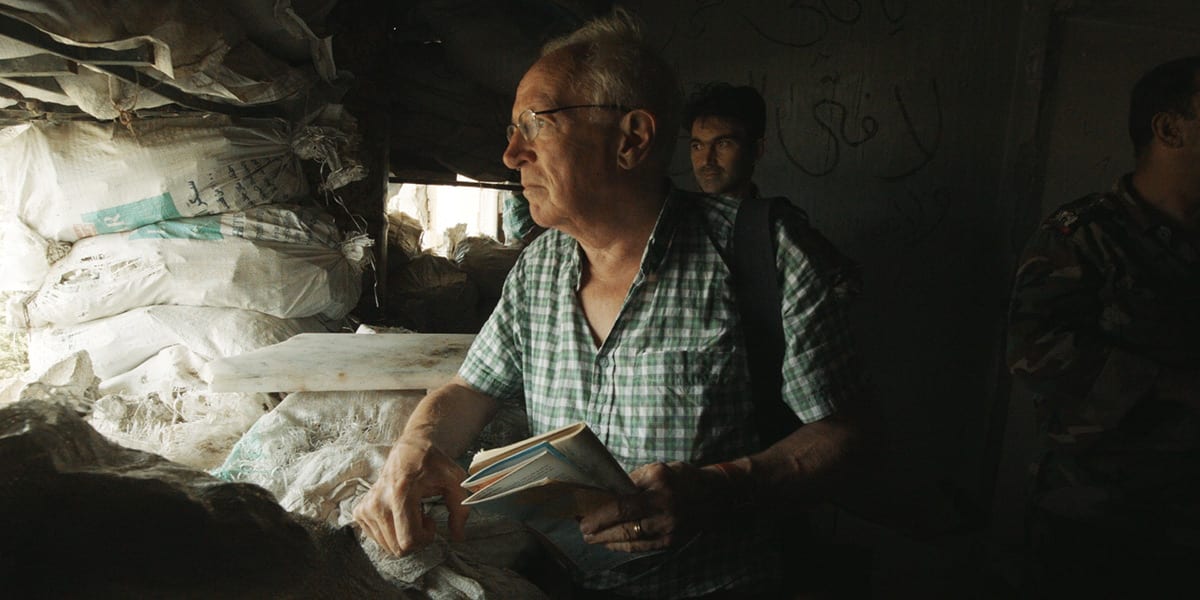

Robert Fisk and Yung Chang and Face2Face host David Peck talk about their new film This Is Not A Movie, fake news, our addiction to social media, complicity, a “dead language”, and something called, “apparent clarity.”
Synopsis:
For more than 40 years, journalist Robert Fisk has reported on some of the most violent and divisive conflicts in the world: Northern Ireland, the Balkans, and Syria. Yong Chang’s This Is Not a Movie captures Fisk in action—feet on the ground, notebook in hand, as he travels into landscapes devastated by war, interviewing both combatants and ordinary folk, ferreting out the facts and firing reports back home to reach an audience of millions.
As corporations devour independent media, and language becomes a weapon, another less obvious battle is taking place. In an ever-accelerating 24-hour news cycle, the process of translating raw experience into incisive and passionate dispatches requires the determination to see things first-hand and the tenacity to say what others won’t.
In his relentless pursuit of the facts, Fisk has attracted his share of controversy. But in spite of the danger, he has continued to cover stories as they unfold, talking directly to the people involved, whether that’s Osama Bin Laden or a young Palestinians woman whose father was recently murdered. Unlike the glamorous films that fueled Fisk’s early ambitions, justice rarely prevails, villains aren’t punished, and there are no tidy endings. As Fisk says, “the truth is that this is not a movie.”
About the Director and Guest:
Yung Chang is the director of Up the Yangtze, China heavyweight and The Fruit Hunters. He is currently completing a screenplay for his first dramatic feature, Eggplant. In 2015, Chang was selected to participate in the prestigious Sundance Labs for Eggplant. His award-winning short Gatekeeper is a Vimeo Staff Pick and distributed by Field of Vision, Laura Poitras’ curated online film unit.
Chang’s films have screened at international film festivals including Sundance, Berlin, Toronto, and IDFA and have played theatrically in cinemas around the world. Up the Yangtze was one of the top-grossing documentary releases in 2008. In 2013, China Heavyweight became the most widely screened social-issues documentary I Chinese history with an official release in 200 Chinese cinemas.
His films have been critically acclaimed, receiving awards in Paris, Milan, Vancouver, San Francisco, the Canadian Screen Award, Taiwan Golden Horse, Cinema Eye Honors, among others and have been nominated at Sundance, the Independent Spirit Awards and the Emmys.
Chang’s films have been shown on international broadcasters including PBS, National Geographic, ARTE, ZDF, Channel 4, HBO, TMN, NHK, CBC, Bell Media, TV2, SBS, RTS and EBS. He’s received funding from major organizations like Sundance Institute, BRITDOC, Telefilm, SODEC, Hot Docs, National Film Board and Canada Council for the Arts.
Chang is the recipient of the Don Haig Award, the Yolande and Pierre Perrault Award, and the Guggenheim Emerging Artist Award. He is a member of the Directors Guild of Canada. In 2013, he was invited to become a member of the Academy of Motion Picture Arts and Sciences, the organization behind the Academy Awards.
Up the Yangtze and The Fruit Hunters were co-produced by the National Film Board and Eyesteel film.
Robert Fisk is the most famous foreign correspondent in Britain, according to The New York Times. He is the Middle East correspondent of the London Independent and has won more than 20 major British and international journalism awards for his reporting from the region. He is the author of several bestselling books, including Pity the Nation, an eyewitness account of the Lebanese Civil War, and the historical volume The Great War for Civilisation: The Conquest of the Middle East. In 2006, he was awarded the prestigious Lifetime Achievement Prize for Cultural Freedom from the Lannan Foundation.
First for The Times of London and then for The Independent, Fisk has been reporting from the Middle East for nearly 40 years, covering everything from the Lebanese Civil War in the 1980s to the Israeli invasions of Lebanon. He was among the first Western journalists to report the massacre at the Palestinian refugee camps of Sabra and Shatila. He also witnessed and reported from the Iranian Revolution (1979), the Soviet invasion of Afghanistan (1979), the Iran-Iraq War (1980–1988), the Algerian Civil War (1990–1998), the US-Iraqi Gulf War (1991), the Bosnian and Kosovo conflicts (1992–1995, 1998), the American attack on Afghanistan (2001), and the US invasion of Iraq (2003). He covered many of the 2011 Arab revolutions, especially Egypt, and is today reporting from the civil war in Syria.
He is the only journalist to have interviewed Osama bin Laden three times—first in Sudan and then in Al-Qaeda’s secret camps in Afghanistan. Born in England in 1946, Fisk holds a BA in English and Linguistics from Lancaster University in the UK, and a PhD in Politics from Trinity College, University of Dublin. He has received 17 honorary doctorates from British, Canadian, and other universities. He is a frequent broadcaster and lecturer around the world.
Fisk is the author of five books, including two works on Irish history, one of them an account of Irish neutrality in the Second World War; it remains a bestseller. Outside of the Middle East, Fisk has written and lectured extensively on the First and Second World Wars. He was the first Englishman to be invited to give a lecture to the families of Irish Catholics killed by British soldiers on Bloody Sunday.
He remains based in Beirut as The Independent’s Middle East correspondent and is currently working on a new history of the region called Night of Power.
Image Copyright: TINAM Inc. and the NFB. Used with permission.
F2F Music and Image Copyright: David Peck and Face2Face. Used with permission.
For more information about David Peck’s podcasting, writing and public speaking please visit his site here.
With thanks to Josh Snethlage and Mixed Media Sound.


 Facebook
Facebook Twitter
Twitter YouTube
YouTube